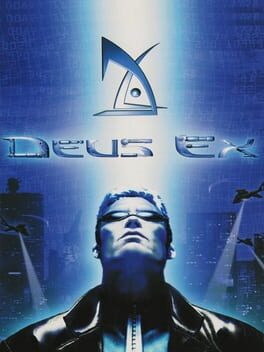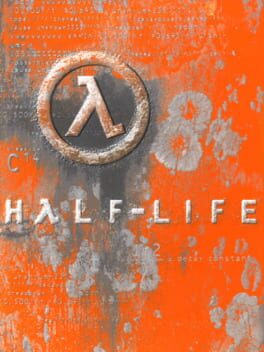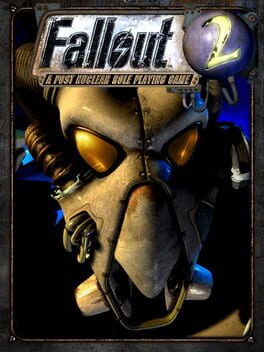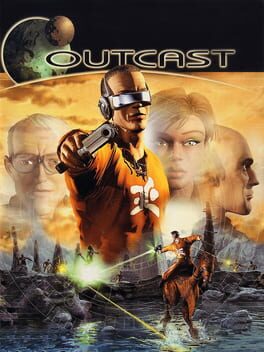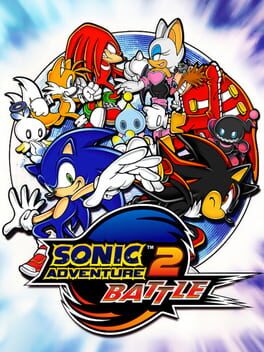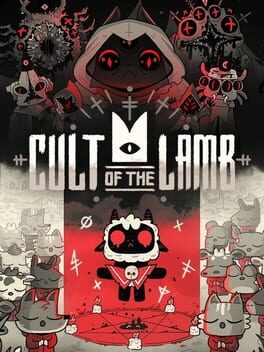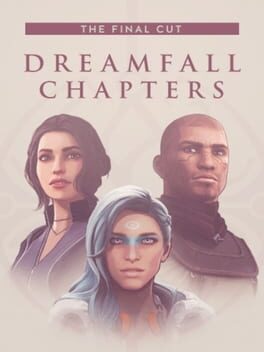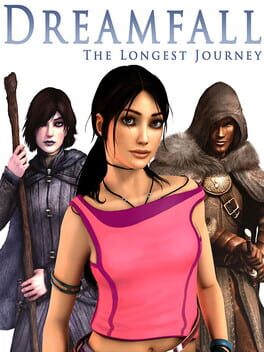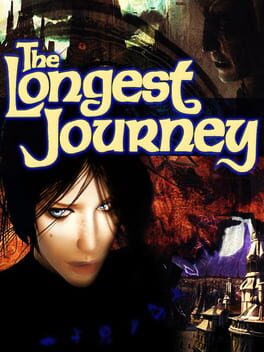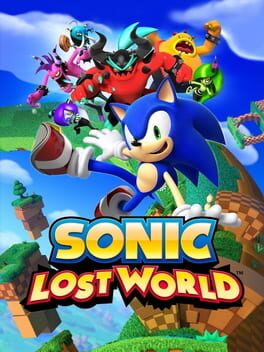FlintFox
Bio
Long-time fan of video games since the 286 PC days. I've set up Backloggd to keep a little more track on what I play, complete and should complete - so don't expect full stock of my collection or memories through the decades.
Long-time fan of video games since the 286 PC days. I've set up Backloggd to keep a little more track on what I play, complete and should complete - so don't expect full stock of my collection or memories through the decades.
Badges

1 Years of Service
Being part of the Backloggd community for 1 year

Well Written
Gained 10+ likes on a single review

Liked
Gained 10+ total review likes

Gone Gold
Received 5+ likes on a review while featured on the front page
Favorite Games
044
Total Games Played
011
Played in 2024
018
Games Backloggd
Recently Played See More
Recently Reviewed See More
Roguelites are now a field so crowded that you need something special to make it genuinely captivating to repeat dangerous dungeons over and over and over again while accruing incremental changes. Cult of the Lamb’s answer to this is to lace the game with irreverent cult humour, add a light city builder/social manager layer to break the monotony and to make every character into a whimsically cute cartoon animal. And what do you know - it’s the most fun I’ve had with a roguelite since Dungeons of Dredmor and stands head and shoulders above most entries into the genre.
I was going to leave the review there but I do have to elaborate slightly on the actual cult simulation side of the game and simply compliment how much fun it is to manage your little flock of faithful followers, controlling their daily lives according to your whims as they spend their days toiling and worshipping (and with the latest content patch, happily sinning) for you. While the action sequences are great, I found the cult simulator sections in-between so engaging that often I found myself more excited to spend more time with my little guys when logging on. The micromanagement isn’t burdensome and can be relaxed to cater to the player’s needs (and I do recommend toggling on the setting to stop time in the village whenever you go into a dungeon) so it never overstays its welcome - and in fact, I could imagine enjoying an alternative version of this game that fully focuses on this aspect in greater detail over the 50/50 split is now. It’s a lot of great fun and nicely breaks the tension between the more intense dungeon running.
I was going to leave the review there but I do have to elaborate slightly on the actual cult simulation side of the game and simply compliment how much fun it is to manage your little flock of faithful followers, controlling their daily lives according to your whims as they spend their days toiling and worshipping (and with the latest content patch, happily sinning) for you. While the action sequences are great, I found the cult simulator sections in-between so engaging that often I found myself more excited to spend more time with my little guys when logging on. The micromanagement isn’t burdensome and can be relaxed to cater to the player’s needs (and I do recommend toggling on the setting to stop time in the village whenever you go into a dungeon) so it never overstays its welcome - and in fact, I could imagine enjoying an alternative version of this game that fully focuses on this aspect in greater detail over the 50/50 split is now. It’s a lot of great fun and nicely breaks the tension between the more intense dungeon running.
Dreamfall: The Longest Journey was released in 2006, a good seven years after the original game and into a different gaming landscape. Classic click n point adventures games had sung their formal swansong years earlier and now only existed in the dreams of random German bedroom developers, and the world was still several years away from either the Kickstarter revival of the genre or its commercially successful metamorphosis into narrative-driven indie games that did away with the puzzles but focused on other aspects of the medium. The balance in the field had also started to shift away from PCs and to consoles, and developing a PC-only adventure game was basically a guaranteed commercial suicide. Funcom didn't have an easy task ahead of them: they had to reinvent the basic gameplay loop, make it work on an entirely different controlling mechanism, and narratively pull something out of the bag that would act both as a genuine continuation for the old fans as well be able to get any newcomers, who might not have even heard of the first game, invested.
Dreamfall stumbles on each and every aspect of the above, and replaying it has only made it more obvious.
The big one is that Dreamfall simply isn't exciting - or fun - to play. Rather than click around in a 2D puzzler, you now control the character (one of three - I'll get to that) directly through a 3rd person perspective in a 3D environment, and at first everything seems ok: you've got an inventory, and games like Gabriel Knight 3 and Grim Fandango had proven that the genre could not only translate to a 3D environment well but take interesting advantages of the new dimension. Dreamfall doesn't do anything like that and despite the new possibilities, it strips down gameplay elements and turns out to be a game that is genuinely frustratingly linear. The puzzles are perfunctory and 95% of them require the player to interact with an environmental object, go to the previous room and pick up an item, and then use that item on the object. They take about 30 seconds to complete and feel like perfunctory busywork to give the illusion that Dreamfall is an old school puzzler; sometimes you even get to combine items, but these items are also typically literally next to one another in the gaming world. The puzzles are so simple that you actually wish they weren't there, because all they do is slow down the narrative for no real reason like a task you have to tick before you're allowed to move forward: there's such a thing as an easy puzzle, and then there's needless admin. The actual gameplay then consists of simply running around from one screen to the next, finding the next piece of spelled-out busywork to tick. The tedium is sometimes broken by minigames depicting lockpicking (actually decent) and hacking (tedious), stealth sections (awkward and frustrating) and combat. The latter is such an obvious dictionary example of a forced action mechanic that has been included purely for marketing purposes: it's universally terrible but at least it's so easy in its mindnumbing simplicity and bad AI that you can do away with it in a moment's matter.
You can also tell that Funcom were struggling with the development in general. The mid-2000s were a particularly awkward time for PC gaming because the massively exploded console market demanded that these platforms had to be considered if you wanted to make a profit with your game, and the hardware and controlling limitations of the Playstation and XBox compared to the PC could really mess with gaming studios who had formerly only ever developed for the PC. At the time this was called consolitis and though the term reeks of PC gaming master race subreddits, the unfortunate name does describe a genuine phenomenon of PC dev teams' botched attempts at streamlining concepts and designs when dealing with the market-demanding limitations. Dreamfall is full of the traditional hallmarks of the effect: massively segmented gameplay areas full of loading screens, minimal interactivity within the environment and supersized menus with less information. The grand city of Marcuria feels smaller in this game than in TLJ despite the extra dimension because it's been split into claustrophobically tunneled areas within small sectors, all the environments feel hollow and devoid of life, and the new main protagonist Zoë's simple microblog entries look tragic compared to April's lengthy journal rambles about her experiences in TLJ.
If The Longest Journey felt like a grand adventure that seemed larger than life and conjured the most incredible vistas and scenes, Dreamfall is like walking the same corridor over and over again. You're told that the building is incredible and has several stories, but all the stairs are awkwardly blocked with ankle-high boxes, every single door is locked and you have to follow the railings to the one room you can enter. I like linear games but Dreamfall takes it to an awkward extreme.
This could be saved by the plot - after all, I love a lot of those of hyperlinear indie narrative adventures that are spiritual successors of the genre in the modern day. And to Funcom's credit, Dreamfall starts out very well. Despite the gameplay interruptions, Dreamfall's initial narrative does get you hooked: Zoë's story arc starts small but despite some contrivances (Zoë's hacker friend is too convenient and one-dimensional) it eventually begins to weave old familiar themes (and worlds and people) and new ideas together in a manner that's actually compelling, even on a replay (though I had forgotten some of the detail, once more). At least if you're a TLJ veteran, which is the perspective I'm coming from: I don't feel that much of the Arcadia side of things is ever really explained thoroughly enough that a complete newcomer could have a full grasp of what's happening and why, and I don't think the writing does a particularly good job of making sure newcomers are treated as evenly as experts. You meet and get to play as April too, now almost a new character after a decade of feeling lost both physically and mentally following the events of TLJ but somewhere inside that gruff demeanour is something recognisable.
Then things begin to fall apart. The further you dwell in the (mostly) Stark-side plot with Zoë the more it becomes a pile-up of random clichés thrown on top of one another (ghost girls, corporate espionage action sequences, conspiracies and secret pasts, corrupt megacorps etc) and eventually you lose track of what you're meant to actually pay attention on, and Zoë's character (and acting) somehow gets less engaged the more you play. In Arcadia, the potential depth in April's personal journey transforms into one-note, out-of-character angst that torpedoes any dialogue (even the return of Crow - still the best character - doesn't help). The third character, the religious zealot Kian, also gains more prominence from halfway point onwards: he has the personality and presence of a balsa wood chair, has the most action sequences out of all the characters and even though you can predict every story beat of his arc it is still executed so haphazardly that you can't believe that it ends up where it does. Sometimes even the wider issues of the game affect the narrative, with the different characters ending up in the same recycled environments in Arcadia over and over again always feeling more like asset reusage than genuine plot requirement.
What I was most looking forward to was the ending though, which I vividly remember completely screwing me up emotionally when I was younger - it's not a happy ending and even though it's telegraphed right from the start, how it was pulled off affected me a lot when I first played through the game. I'm glad to say that the game does pick itself back up in its very last moments and it still has some beautifully sad moments to it... but I didn't find it so powerful this time around because I was so much more aware of just how much the game does away with on the way to the big final beat. Dreamfall is the middle part of a trilogy and like all the worst middle parts, loads itself up with so many cliffhangers and raises so many questions that are left unanswered that it's downright unsatisfactory. What could be a poignant ending is somewhat dampened when I realised that even with the attention span of an adult, central elements of the entire game had been left completely blank and for half the game you don't know why you're doing something or what it is you're in the end even doing.
This is probably the third time I've played Dreamfall and each time I come away from it with more hesitations. Once the novelty - the return to the familiar things from the first game (particularly powerful if you had been aware of the original since 1999), experiencing the new plot for the first time, etc - has worn off, you start paying attentions to everything else and you begin to see the holes. The plot and the characters are inconsistent and the gameplay is subpar, and once those start jumping over your face it's hard to pay attention to the good parts. Despite the overall negative tone of the above I wouldn't call Dreamfall a bad game - but it is a truly middling gameplay experience and ultimately unsuccessful in most of its goals. It's a game that's going through a major identity crisis in so many ways, by developers who obviously weren't certain what they wanted to achieve in the changed market they were in - and though Deus Ex: Invisible War is typically considered the iconic example of the consolitis years, Dreamfall is a close personal second to me.
Dreamfall stumbles on each and every aspect of the above, and replaying it has only made it more obvious.
The big one is that Dreamfall simply isn't exciting - or fun - to play. Rather than click around in a 2D puzzler, you now control the character (one of three - I'll get to that) directly through a 3rd person perspective in a 3D environment, and at first everything seems ok: you've got an inventory, and games like Gabriel Knight 3 and Grim Fandango had proven that the genre could not only translate to a 3D environment well but take interesting advantages of the new dimension. Dreamfall doesn't do anything like that and despite the new possibilities, it strips down gameplay elements and turns out to be a game that is genuinely frustratingly linear. The puzzles are perfunctory and 95% of them require the player to interact with an environmental object, go to the previous room and pick up an item, and then use that item on the object. They take about 30 seconds to complete and feel like perfunctory busywork to give the illusion that Dreamfall is an old school puzzler; sometimes you even get to combine items, but these items are also typically literally next to one another in the gaming world. The puzzles are so simple that you actually wish they weren't there, because all they do is slow down the narrative for no real reason like a task you have to tick before you're allowed to move forward: there's such a thing as an easy puzzle, and then there's needless admin. The actual gameplay then consists of simply running around from one screen to the next, finding the next piece of spelled-out busywork to tick. The tedium is sometimes broken by minigames depicting lockpicking (actually decent) and hacking (tedious), stealth sections (awkward and frustrating) and combat. The latter is such an obvious dictionary example of a forced action mechanic that has been included purely for marketing purposes: it's universally terrible but at least it's so easy in its mindnumbing simplicity and bad AI that you can do away with it in a moment's matter.
You can also tell that Funcom were struggling with the development in general. The mid-2000s were a particularly awkward time for PC gaming because the massively exploded console market demanded that these platforms had to be considered if you wanted to make a profit with your game, and the hardware and controlling limitations of the Playstation and XBox compared to the PC could really mess with gaming studios who had formerly only ever developed for the PC. At the time this was called consolitis and though the term reeks of PC gaming master race subreddits, the unfortunate name does describe a genuine phenomenon of PC dev teams' botched attempts at streamlining concepts and designs when dealing with the market-demanding limitations. Dreamfall is full of the traditional hallmarks of the effect: massively segmented gameplay areas full of loading screens, minimal interactivity within the environment and supersized menus with less information. The grand city of Marcuria feels smaller in this game than in TLJ despite the extra dimension because it's been split into claustrophobically tunneled areas within small sectors, all the environments feel hollow and devoid of life, and the new main protagonist Zoë's simple microblog entries look tragic compared to April's lengthy journal rambles about her experiences in TLJ.
If The Longest Journey felt like a grand adventure that seemed larger than life and conjured the most incredible vistas and scenes, Dreamfall is like walking the same corridor over and over again. You're told that the building is incredible and has several stories, but all the stairs are awkwardly blocked with ankle-high boxes, every single door is locked and you have to follow the railings to the one room you can enter. I like linear games but Dreamfall takes it to an awkward extreme.
This could be saved by the plot - after all, I love a lot of those of hyperlinear indie narrative adventures that are spiritual successors of the genre in the modern day. And to Funcom's credit, Dreamfall starts out very well. Despite the gameplay interruptions, Dreamfall's initial narrative does get you hooked: Zoë's story arc starts small but despite some contrivances (Zoë's hacker friend is too convenient and one-dimensional) it eventually begins to weave old familiar themes (and worlds and people) and new ideas together in a manner that's actually compelling, even on a replay (though I had forgotten some of the detail, once more). At least if you're a TLJ veteran, which is the perspective I'm coming from: I don't feel that much of the Arcadia side of things is ever really explained thoroughly enough that a complete newcomer could have a full grasp of what's happening and why, and I don't think the writing does a particularly good job of making sure newcomers are treated as evenly as experts. You meet and get to play as April too, now almost a new character after a decade of feeling lost both physically and mentally following the events of TLJ but somewhere inside that gruff demeanour is something recognisable.
Then things begin to fall apart. The further you dwell in the (mostly) Stark-side plot with Zoë the more it becomes a pile-up of random clichés thrown on top of one another (ghost girls, corporate espionage action sequences, conspiracies and secret pasts, corrupt megacorps etc) and eventually you lose track of what you're meant to actually pay attention on, and Zoë's character (and acting) somehow gets less engaged the more you play. In Arcadia, the potential depth in April's personal journey transforms into one-note, out-of-character angst that torpedoes any dialogue (even the return of Crow - still the best character - doesn't help). The third character, the religious zealot Kian, also gains more prominence from halfway point onwards: he has the personality and presence of a balsa wood chair, has the most action sequences out of all the characters and even though you can predict every story beat of his arc it is still executed so haphazardly that you can't believe that it ends up where it does. Sometimes even the wider issues of the game affect the narrative, with the different characters ending up in the same recycled environments in Arcadia over and over again always feeling more like asset reusage than genuine plot requirement.
What I was most looking forward to was the ending though, which I vividly remember completely screwing me up emotionally when I was younger - it's not a happy ending and even though it's telegraphed right from the start, how it was pulled off affected me a lot when I first played through the game. I'm glad to say that the game does pick itself back up in its very last moments and it still has some beautifully sad moments to it... but I didn't find it so powerful this time around because I was so much more aware of just how much the game does away with on the way to the big final beat. Dreamfall is the middle part of a trilogy and like all the worst middle parts, loads itself up with so many cliffhangers and raises so many questions that are left unanswered that it's downright unsatisfactory. What could be a poignant ending is somewhat dampened when I realised that even with the attention span of an adult, central elements of the entire game had been left completely blank and for half the game you don't know why you're doing something or what it is you're in the end even doing.
This is probably the third time I've played Dreamfall and each time I come away from it with more hesitations. Once the novelty - the return to the familiar things from the first game (particularly powerful if you had been aware of the original since 1999), experiencing the new plot for the first time, etc - has worn off, you start paying attentions to everything else and you begin to see the holes. The plot and the characters are inconsistent and the gameplay is subpar, and once those start jumping over your face it's hard to pay attention to the good parts. Despite the overall negative tone of the above I wouldn't call Dreamfall a bad game - but it is a truly middling gameplay experience and ultimately unsuccessful in most of its goals. It's a game that's going through a major identity crisis in so many ways, by developers who obviously weren't certain what they wanted to achieve in the changed market they were in - and though Deus Ex: Invisible War is typically considered the iconic example of the consolitis years, Dreamfall is a close personal second to me.
This review contains spoilers
There is this... not a genre, nor a trope, but a feel perhaps, that I like to call the Grand Adventure. The Grand Adventure is your classic story of a young, plucky no-one important soon finding themselves in the middle of something larger than life, discovering the whole vast world beyond their imagination and setting on a quest that takes them from one end of the realm to the other, in the process becoming Someone. It's a classic hero's journey tale that most stories in the world tell in their own words, but the difference between them and a Grand Adventure lies in a certain kind of je ne sais quoi atmosphere of it all. I, primarily, associate this with the fantasy genre: Lord of the Rings is an obvious pick here, but my favourite example of that feel being nailed perfectly is Final Fantasy 9. That, and The Longest Journey.
The tale of the young art student April Ryan discovering that not only beyond her ca. year 2200 Earth lies the fantasy realm of Arcadia, that these two worlds used to be the one and the same before being split in half and that she has a prophesied role to play in ensuring the balance between the two remains in place while a secretive organisation moves to tilt the game in their favour, is a wonderfully well crafted Grand Adventure. April's haphazard search for understanding what's behind all the weird things happening around her lately soon opens up to an epic tale that takes her through space stations and enchanted castles, underwater cities and cyberpunk hellscapes, and the more you play it the more grippingly fascinating it becomes. Both Stark (our world) and Arcadia are beautifully and richly designed and the major characters in them are excellently written and acted - April being the prime example as her demeanour and personality change over the chapters due to everything she's seen and heard, and of course her talking bird friend Crow who deserves a place in the pantheon of great sidekicks. Tørnquist's writing and world building knows when to have a lighter touch and when things need to focus on the serious and the balance is executed so well that whatever tone the game takes, it feels like the right one.
The greatest thing is, coming back to this after a long time away, it's still really strong. The last time I replayed The Longest Journey was back when I was still installing it from CD-ROMs (it was a four disc game!), this time opting for a simple GOG download instead as - coincidentally - the game was on sale the very time I started thinking about replaying this again. So it's been a while and in the ages between I had either forgotten more than I thought I had, or I simply didn't get all the nuances when I was younger - but whatever the case, I promptly fell in love with the game all over again and it flooded back to me why it became so special. You begin to care about the worlds and the characters so much that you just want to spend more time in it, and though not everything has perhaps aged perfectly (the game lightly tackles sexism on account of April's gender in a very masculine world, but it's handled with all the nuance of an adult male videogame writer imagining how a witty young female videogame protagonist would respond to things) the strengths more than make up for it. I loved once again exploring Arcadia in particular and there's tangible passion in how its different cultures, traditions and extended histories are portrayed.
I had also forgotten what a real, brilliant gut punch the ending is. Right in the last steps of April's journey, the rug is pulled underneath her feet as it becomes clear she never was the prophesied Chosen One - she was simply destiny's tool to help the actual Chosen One take their place in the great cycle. It's handled brilliantly, particularly in April's palpable mixed emotions of effectively having her fate rerouted almost as soon as she had finally accepted her place in the world. It's more common these days to see Chosen One stories get deconstructed or actively questioned within their narratives, but The Longest Journey did this a long before it became almost expected - and it still does it better than many of the stories that have come since, simply because of how closely the game has managed to get the player to believe in it too. It makes for a really beautifully bittersweet ending - which is then turned into a fuzzily heartwarming one thanks to the olive branch of an epilogue.
Outside its narrative and design, The Longest Journey is a click n point adventure game and it's mostly a really well done one. It suffers from a few obtuse puzzles, most infamously the inflatable duck puzzle which has a reputation in the click n point communities, and there's a few puzzles where a relatively simple task is made a lot trickier to comprehend thanks to how they're presented - but generally speaking there's logic to what the game tries to coax the player to go through and there's some impressive Checkov's Gunning going around in both the world and the items the player carries (some which can take up space in the player's endless inventory for several chapters) which feel particularly satisfying to solve. The biggest grumbles primarily come from where it's clear the original vision had to be streamlined in order to ship the game in time: the much foreshadowed underwater city is restricted to a single room and a few exterior locations despite the vast towers in the horizon and it feels genuinely awkward how April cracks the long-forgotten secret history of the race by simply removing some seaweed from a cavern couple of minutes away from the said city, and after spending so much time getting two of the macguffins she needs, the game literally hands her the remaining two in the space of ten minutes. It takes away from the epic sense of adventure that the game is otherwise so good at delivering.
But those are almost minor things, and the only real bother I had during my playthrough was the weird glitch where the game wouldn't always recognise my mouse clicks when trying to use the interaction menu (my poor mouse L1 button must feel hammered). Spending a few days again with this game otherwise felt like seeing an old friend for the first time in years, still instantly familiar yet a little changed. I was in love with this world again. A
The tale of the young art student April Ryan discovering that not only beyond her ca. year 2200 Earth lies the fantasy realm of Arcadia, that these two worlds used to be the one and the same before being split in half and that she has a prophesied role to play in ensuring the balance between the two remains in place while a secretive organisation moves to tilt the game in their favour, is a wonderfully well crafted Grand Adventure. April's haphazard search for understanding what's behind all the weird things happening around her lately soon opens up to an epic tale that takes her through space stations and enchanted castles, underwater cities and cyberpunk hellscapes, and the more you play it the more grippingly fascinating it becomes. Both Stark (our world) and Arcadia are beautifully and richly designed and the major characters in them are excellently written and acted - April being the prime example as her demeanour and personality change over the chapters due to everything she's seen and heard, and of course her talking bird friend Crow who deserves a place in the pantheon of great sidekicks. Tørnquist's writing and world building knows when to have a lighter touch and when things need to focus on the serious and the balance is executed so well that whatever tone the game takes, it feels like the right one.
The greatest thing is, coming back to this after a long time away, it's still really strong. The last time I replayed The Longest Journey was back when I was still installing it from CD-ROMs (it was a four disc game!), this time opting for a simple GOG download instead as - coincidentally - the game was on sale the very time I started thinking about replaying this again. So it's been a while and in the ages between I had either forgotten more than I thought I had, or I simply didn't get all the nuances when I was younger - but whatever the case, I promptly fell in love with the game all over again and it flooded back to me why it became so special. You begin to care about the worlds and the characters so much that you just want to spend more time in it, and though not everything has perhaps aged perfectly (the game lightly tackles sexism on account of April's gender in a very masculine world, but it's handled with all the nuance of an adult male videogame writer imagining how a witty young female videogame protagonist would respond to things) the strengths more than make up for it. I loved once again exploring Arcadia in particular and there's tangible passion in how its different cultures, traditions and extended histories are portrayed.
I had also forgotten what a real, brilliant gut punch the ending is. Right in the last steps of April's journey, the rug is pulled underneath her feet as it becomes clear she never was the prophesied Chosen One - she was simply destiny's tool to help the actual Chosen One take their place in the great cycle. It's handled brilliantly, particularly in April's palpable mixed emotions of effectively having her fate rerouted almost as soon as she had finally accepted her place in the world. It's more common these days to see Chosen One stories get deconstructed or actively questioned within their narratives, but The Longest Journey did this a long before it became almost expected - and it still does it better than many of the stories that have come since, simply because of how closely the game has managed to get the player to believe in it too. It makes for a really beautifully bittersweet ending - which is then turned into a fuzzily heartwarming one thanks to the olive branch of an epilogue.
Outside its narrative and design, The Longest Journey is a click n point adventure game and it's mostly a really well done one. It suffers from a few obtuse puzzles, most infamously the inflatable duck puzzle which has a reputation in the click n point communities, and there's a few puzzles where a relatively simple task is made a lot trickier to comprehend thanks to how they're presented - but generally speaking there's logic to what the game tries to coax the player to go through and there's some impressive Checkov's Gunning going around in both the world and the items the player carries (some which can take up space in the player's endless inventory for several chapters) which feel particularly satisfying to solve. The biggest grumbles primarily come from where it's clear the original vision had to be streamlined in order to ship the game in time: the much foreshadowed underwater city is restricted to a single room and a few exterior locations despite the vast towers in the horizon and it feels genuinely awkward how April cracks the long-forgotten secret history of the race by simply removing some seaweed from a cavern couple of minutes away from the said city, and after spending so much time getting two of the macguffins she needs, the game literally hands her the remaining two in the space of ten minutes. It takes away from the epic sense of adventure that the game is otherwise so good at delivering.
But those are almost minor things, and the only real bother I had during my playthrough was the weird glitch where the game wouldn't always recognise my mouse clicks when trying to use the interaction menu (my poor mouse L1 button must feel hammered). Spending a few days again with this game otherwise felt like seeing an old friend for the first time in years, still instantly familiar yet a little changed. I was in love with this world again. A
